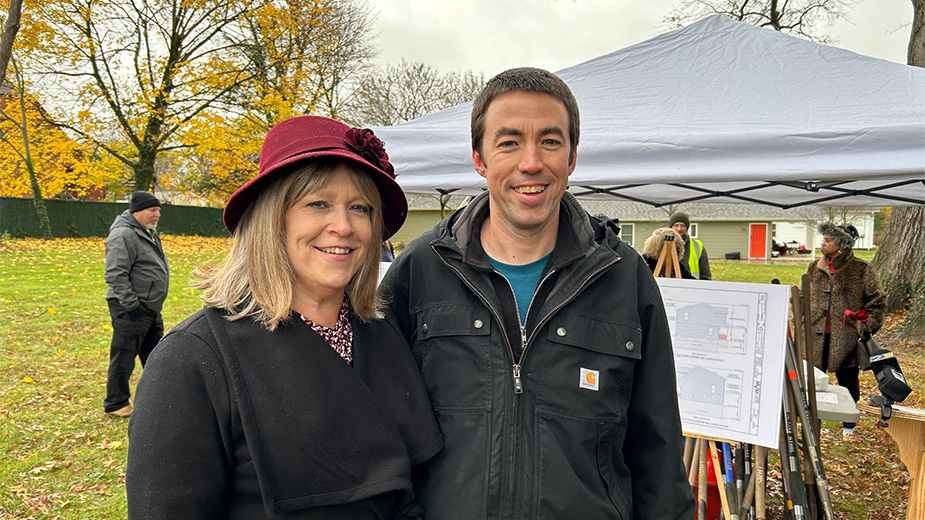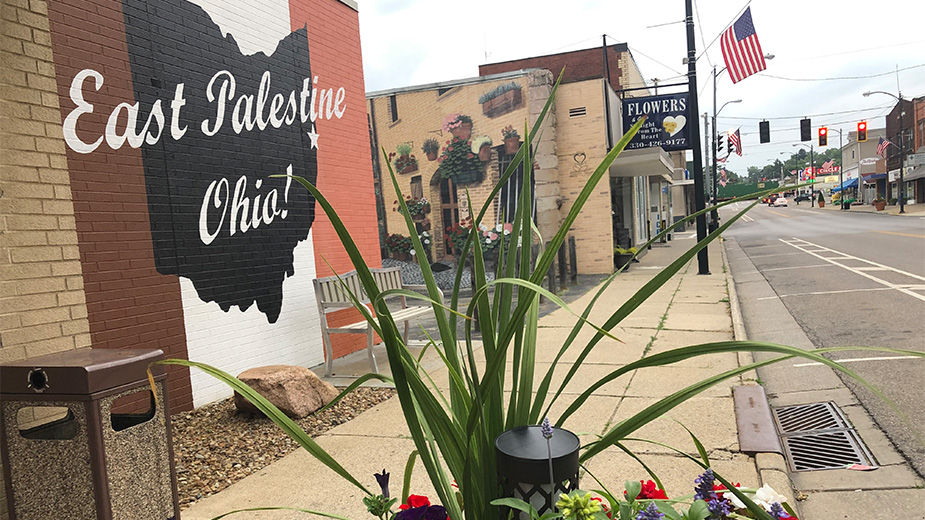Collaborations Unify City of Sharon’s Development Goals
SHARON, Pa. – Scott Andrejchak, city manager just under four years, muses on the many changes he has seen in his city. People now look at Sharon “as a destination in a way that maybe they didn’t [before],” he begins.
Primary Health Network, which he describes as having “a huge footprint across the northern tier of Pennsylvania” and “growing by leaps and bounds,” is building a new headquarters downtown, the first new commercial office building there since 1969. Sharon Regional Health System, the largest employer in the city and Mercer County, is “on the verge of a large building project here as well,” he says.
Last year, Noise Solutions Inc., a Canadian company, established its first U.S. manufacturing operation on Vine Street, lured to Sharon in part by incentives city officials put together.
Streetscape improvements are among the signs most visible to the public of the city’s progress as are the many small shops that fill once-vacant storefronts downtown. Plans were recently shown to the public for another streetscape project, on State Street from Oakland Avenue to Forker Boulevard.
“We now have buildings in downtown that literally were caving in and we’ve had people that have purchased those buildings. They have plans for those buildings,” Andrejchak says. “We have loft apartments in downtown Sharon.”
Such plans would have been “a fantasy,” as the city manager describes it, just 15 years ago. “The city has played a part to support it, and we’re trying to get out of everyone’s way in some ways too,” he remarks.
Eight years ago, residents were ready for change. In a referendum in the 2007 general election, voters scrapped Sharon’s charter as a third-class city, which had a strong-mayor form of government, in favor of a home rule charter with a city manager hired by the city council.
“The city turned around when home rule came into effect,” remarks John Evans, chairman of the community and economic development commission, one entity established by the city.
Evans, a commercial lender with First National Bank of Pennsylvania, says the home rule charter provided Sharon with a professional manager and gave it more taxing options, allowing reduced reliance on property taxes.
The resurgence has been boosted by feedback and assistance from the commissions created or activated under the home rule charter and grassroots associations.
The community and economic development commission provides guidance and makes recommendations to the city leadership regarding community and economic development, Evans says.
“Generally they make recommendations, but they really do more than that because it’s a place where we’ll share information and ideas,” Andrejchak says.
“We help as a volunteer organization with the marketing of Sharon,” adds Laura Ackley, general manager of Donna’s Diner and the Buhl Mansion, who also serves on the commission. “We look at industrial growth as well and we help with small-business loans and things like that.”
Among the development commission’s first activities were organizing and surveying focus groups and helping to write a strategic plan for the city, Evans says. The focus groups “set forth various outcomes they would like to have put in place and in doing so revitalize the city,” he notes. “It’s a way to get a sense for what the community wants.”
The commission has helped put together financial incentives, including a revolving loan fund, that helped lure Noise Solutions and the Ellwood Crankshaft Group. Both took warehouse space on Sharpsville Avenue.
Initiatives by the commissions – one is focused on beautification – “created a sense of community where people develop confidence and reverse the negative mindset” and led people to invest in the city, Andrejchak says.
“We hope to inspire others and I think we have,” says the chairman of the beautification commission, Brian Kepple. Seeing such projects inspires people to clean up their own properties or volunteer for initiatives, he says.
Sharon has successfully worked with Penn-Northwest Development Corp. and other partners to attract manufacturing concerns to shore up its economic base, the initiative to bring in Noise Solutions being one example, Andrejchak says.
“We are working as best we can with the community development department and the U.S. Department of Housing and Urban Development to combat blight in neighborhoods because a big component of having a vibrant community is having people that want to live in the community,” he continues.
The community development department addresses lead paint used in older houses where children under 6 live or are cared for, says Janet Thomas, its executive director. The department rehabilitates about 30 houses each year and will work with a private developer to acquire and rehabilitate houses for resale.
The progress Michael Clark, owner of Pro Vinyl Shop in Sandy Lake, saw led him to open a store downtown.
“A few years ago it wasn’t as nice as it is now,” he remarks. Because downtown businesses are upgrading their facades, he is seeing more traffic from those operations. “Everybody’s starting to get new signs,” he reports.
Among the keys to downtown’s revitalization is a focus, similar to that in other cities, on arts and culture to stimulate growth, Andrejchak says. “Probably the most obvious example of that – and the biggest – would be WaterFire,” about to launch its third season, he remarks. In addition, there is greater recognition of the Shenango River as an asset. City officials are assembling a master plan for areas along the river.
“One of the things I have noticed over the last few years is the collaboration,” Ackley says. Downtown merchants work together to “do a lot of marketing together now as opposed to everybody trying to own their own piece of the pie.”
Ackley launched Greater Sharon Associates, a private group that promotes and stages events downtown such as Small Business Saturday and Spring Fling.
Sara McCauley, who owns two shops downtown – Redeemed and Beaders Utopia – heads the group. Ackley “began the group slowly … and now we have a pretty strong group,” McCauley says. “The business owners are excited and we’re just continuing to see the growth downtown. That really excites people.”
Pictured: City officials recognize the Shenango River as an asset and are working on a master plan for the river that cuts through downtown.
WATCH VIDEO:
“3 Minutes With” Laura Ackley
Copyright 2024 The Business Journal, Youngstown, Ohio.



